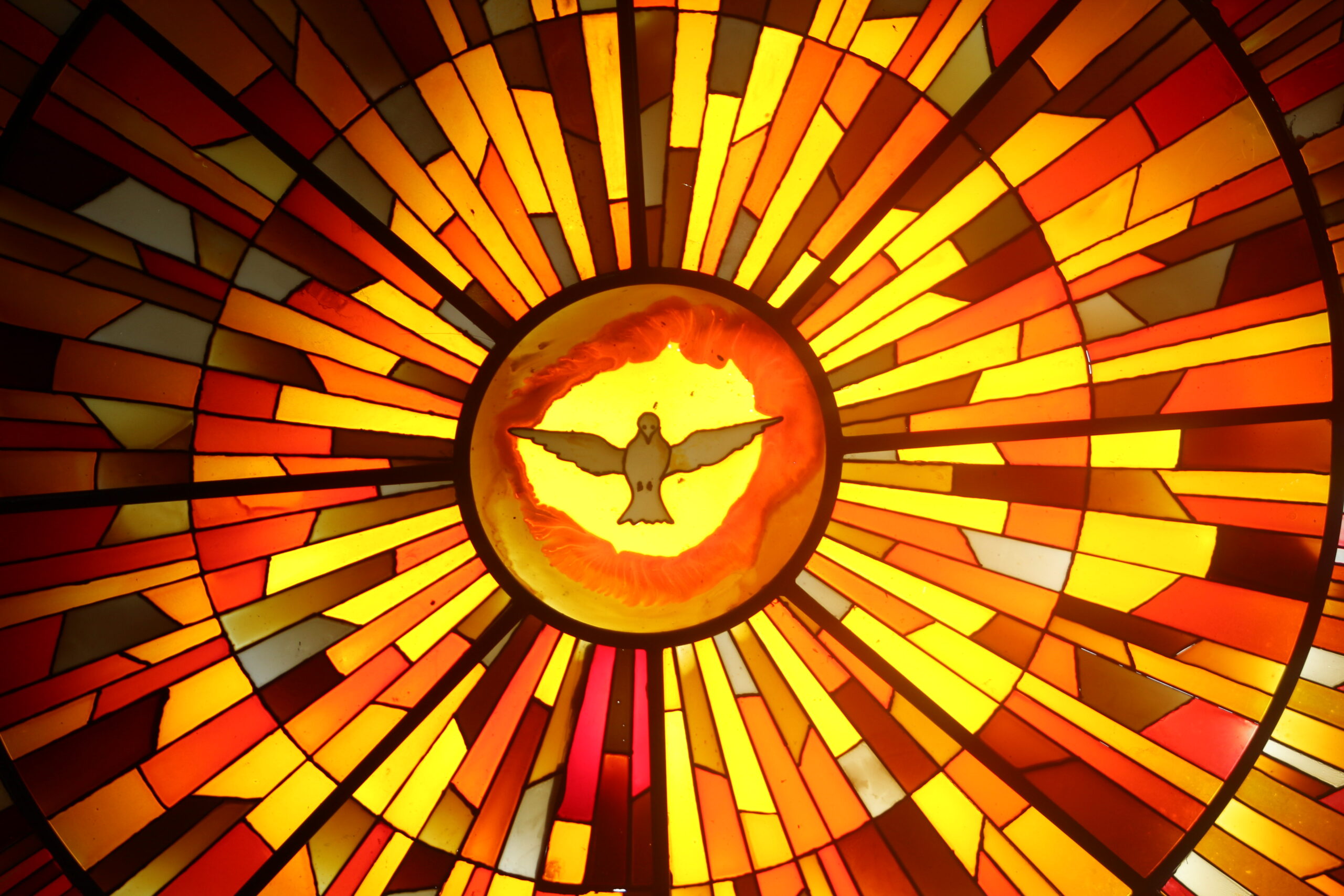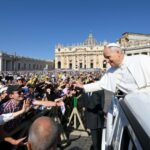The Pope reminds us that the Holy Spirit is the “protagonist of proclamation” and that it is important for all of us to listen to Him and let ourselves be guided
“In our catechesis journey on the passion of evangelization, today we reflect on the words of Jesus that we just heard: «Go, therefore, and make disciples of all nations, baptizing them in the name of the Father and of the Son and of the Holy Spirit» (Mt 28:19). Go — says the Risen One — not to indoctrinate, not to proselytize, no, but to make disciples, that is, to give everyone the opportunity to come into contact with Jesus, to know Him and love Him freely.
Go baptizing: baptizing means immersing, and therefore, before indicating a liturgical action, it expresses a vital action: immersing one’s own life in the Father, in the Son, in the Holy Spirit; experiencing each day the joy of God’s presence who is near us as Father, as Brother, as Spirit acting within us, in our own spirit. Baptizing is immersing oneself in the Trinity.
Baptizing means immersing, and therefore, before indicating a liturgical action, it expresses a vital action: immersing one’s own life in the Father, in the Son, in the Holy Spirit
When Jesus says to His disciples — and also to us —: “Go!”, He is not just communicating a word. No. He also communicates the Holy Spirit, because it is only thanks to Him, the Holy Spirit, that one can receive Christ’s mission and carry it forward (cf. Jn 20:21-22). The Apostles, in fact, remain locked in the Cenacle out of fear until the day of Pentecost arrives and the Holy Spirit descends upon them (cf. Acts 2:1-13).
And at that moment, fear disappears and with its strength, these fishermen, mostly illiterate, will change the world. “But if they don’t know how to speak…”. But it is the word of the Spirit, the strength of the Spirit that carries them forward to change the world. The proclamation of the Gospel, therefore, is carried out only in the strength of the Spirit, which precedes the missionaries and prepares hearts: He is “the engine of evangelization”.
The proclamation of the Gospel, therefore, is carried out only in the strength of the Spirit, which precedes the missionaries and prepares hearts: He is “the engine of evangelization”.
We see this in the Acts of the Apostles, where on every page it is evident that the protagonist of proclamation is not Peter, Paul, Stephen, or Philip, but the Holy Spirit. Also in Acts, a pivotal moment from the early Church is narrated, which can also tell us a lot. Then, as today, alongside consolations, tribulations did not lack — good moments and not-so-good moments — joys were accompanied by worries, both things. One particular concern: how to behave with pagans who approached the faith, with those who did not belong to the Jewish people, for example. Were they obliged or not to observe the prescriptions of the Mosaic Law? This was not a minor matter for those people. Thus, two groups formed: those who believed that observing the Law was non-negotiable and those who did not.
To discern, the Apostles gather at what is called the “Jerusalem Council,” the first in history. How to resolve the dilemma? One could have sought a good compromise between tradition and innovation: some norms are observed and others are ignored. However, the Apostles do not follow this human wisdom to seek a diplomatic balance between the two; instead, they adapt to the work of the Spirit who had anticipated them, descending upon both the pagans and themselves.
And therefore, removing almost all obligations tied to the Law, they communicate the final decisions, made — and thus written —: “the Holy Spirit and we” (cf. Acts 15:28), we have decided, the Holy Spirit with us, thus the Apostles always act. Together, without dividing, despite having different sensitivities and opinions, they listen to the Spirit. And He teaches one thing, which is also valid today: all religious tradition is useful if it facilitates the encounter with Jesus, all religious tradition is useful if it facilitates the encounter with Jesus.
We could say that the historic decision of the first Council, from which we also benefit, was driven by a principle, the principle of proclamation: in the Church, everything must conform to the demands of the Gospel proclamation; not to the opinions of conservatives or progressives, but to the fact that Jesus reaches people’s lives. Therefore, every option, every custom, every structure, every tradition must be evaluated in the measure that it promotes the proclamation of Christ.
When decisions are made in the Church, for example, ideological divisions: “I am conservative because… I am progressive because…”. But where is the Holy Spirit? Be attentive, because the Gospel is not an idea, the Gospel is not an ideology: the Gospel is an announcement that touches the heart and changes the heart, but if you take refuge in an idea, in an ideology whether right-wing, left-wing, or centrist, you are turning the Gospel into a political party, an ideology, a club of people. The Gospel always gives you this freedom of the Spirit that acts within you and carries you forward. And how necessary it is today to take the freedom of the Gospel by the hand and let yourself be carried forward by the Spirit.
Be attentive, because the Gospel is not an idea, the Gospel is not an ideology: the Gospel is an announcement that touches the heart and changes the heart
Thus the Spirit illuminates the path of the Church, always. In fact, it is not only the light of hearts, but the light that guides the Church: it clarifies, helps to distinguish, helps to discern. That is why it is necessary to invoke Him often; let’s do so today as well, at the beginning of Lent. Because as a Church, we can have well-defined times and spaces, communities, institutes, and movements well organized, but without the Spirit, everything remains soulless. Organization is not enough: it is the Spirit that gives life to the Church. If the Church does not pray to Him and invoke Him, it closes in on itself, in sterile and exhausting debates, in tiring polarizations, while the flame of mission fades. It is very sad to see the Church as if it were a parliament; no, the Church is something else. The Church is the community of men and women who believe and proclaim Jesus Christ, but moved by the Holy Spirit, not by their own reasons. Yes, reason is used, but the Spirit comes to illuminate and move it.
The Spirit makes us go out, pushes us to proclaim the faith to confirm us in the faith, urges us to go on mission to find out who we are. That is why the Apostle Paul recommends: «Do not quench the Spirit» (1 Thess 5:19), do not quench the Spirit. Let us pray often to the Spirit, invoke Him, ask Him daily to ignite His light within us. Let’s do it before every encounter, to become apostles of Jesus with the people we meet. Do not quench the Spirit in Christian communities and also within each of us.
Dear brothers and sisters, we set out and keep setting out, as a Church, from the Holy Spirit. “Undoubtedly, it is important that in our pastoral planning we start from sociological surveys, analyses, lists of difficulties, expectations, and complaints. However, it is much more important to start from the experiences of the Spirit: this is the true starting point. And that is why it is necessary to seek them, list them, study them, interpret them. It is a fundamental principle that, in spiritual life, is called the primacy of consolation over desolation. First comes the Spirit who consoles, reanimates, illuminates, moves; afterwards, desolation, suffering, darkness will also come, but the principle to regulate oneself in darkness is the light of the Spirit (C.M. Martini, Evangelizing in the consolation of the Spirit, September 25, 1997). This is the principle to regulate oneself in things that are not understood, in confusions, also in many darknesses, it is important.
Let us try to ask ourselves if we open ourselves to this light, if we give it space: do I invoke the Spirit? Each one answer internally. How many of us pray to the Spirit? “No, Father, I pray to the Virgin, I pray to the saints, I pray to Jesus, but sometimes I pray the Our Father, I pray to the Father” — “And to the Spirit?” Do you not pray to the Spirit, who is what makes your heart move, who leads you forward, who brings you consolation, who pushes you to evangelize and go on mission? I leave you with this question: Do I pray to the Holy Spirit? Do I let myself be guided by Him, who invites me not to close myself but to bring Jesus, to testify to the primacy of God’s consolation over the desolation of the world? May the Virgin, who has understood this well, help us to understand it.”










